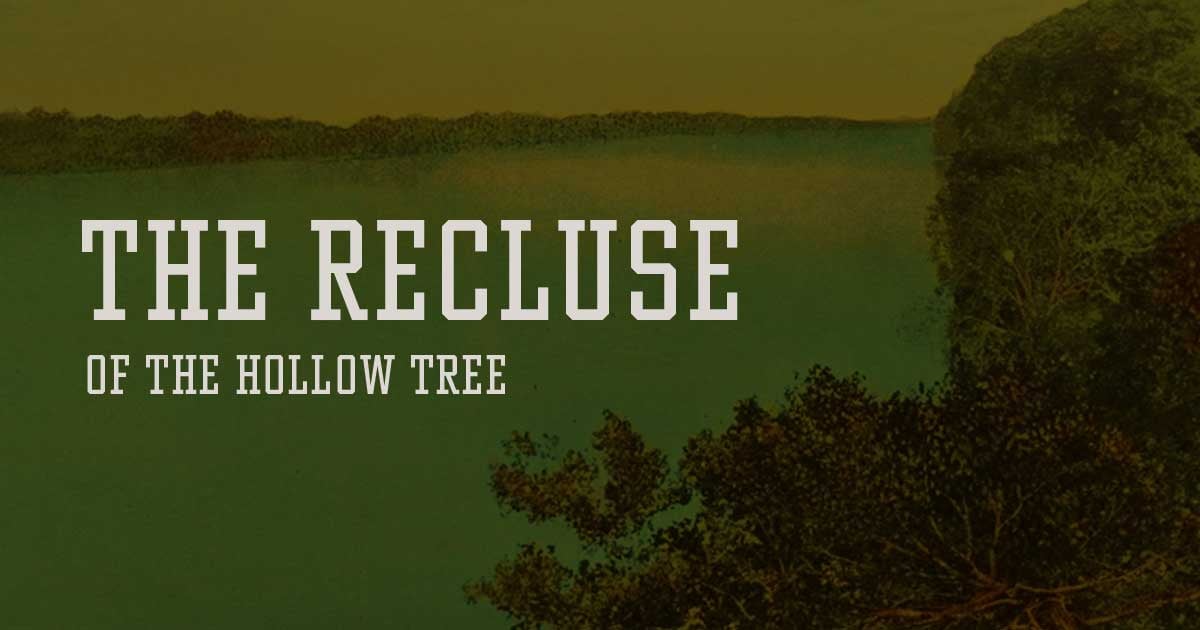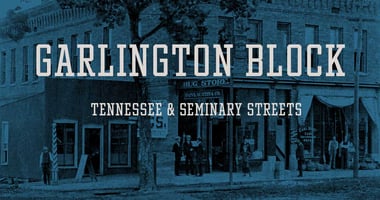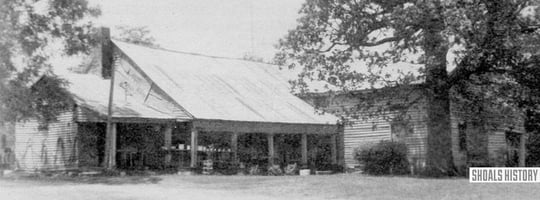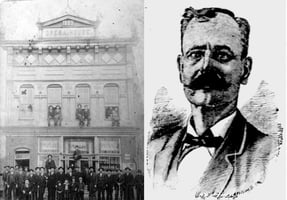Garlington Block: at the corner of Tennessee and Seminary streets in Florence, AL In the late 19th...
The Recluse of the Hollow Tree

Originally printed in the Florence Gazette, Feb 19, 1853. Reprinted here without edits or commentary.
Strange Story. The Recluse of the hollow tree.
Something over three years ago, a young man, apparently about 25 or 30 years of age, stopped at Bainbridge, a noted landing, situated at the foot of the Mussel Shoals, in this county. He gave his name as Goins, from Knox county, East Tennessee. He came with a crowd of flatboatmen, who annually descended from the upper waters of the Tennessee, and tarry for a season at the foot of the Shoals.
Goins remained after his migratory companions had all gone their way. His conduct was observed to be sometimes eccentric, though always quiet, taciturn, and approaching to melancholy. After a time he took up his abode in one of those numerous caves which are found in the high and precipitous bluffs skirting along the northern shores of the Tennessee river from Shoal creek to Florence. The one selected by this poor outcast was situated a few hundred yards from the ferry, and near the public road. He was often seen sitting at the mouth of his lonely cell, or reclining on some projecting rock, basking in the genial rays of an autumnal sun. He shunned all approach, and many were the cold and heartless jeers passed upon him by the passers by.
Soon, however, he disappeared, and all traces of him were lost. Two long years passed away – years long to be remembered as having witnessed one at least of the most dreary, protracted, and intensely severe winters that ever frosted the bosom of our earth. One day last December two men were hunting over the Broken River hills, attached to the plantation of Mr. John J. Craig, and discovered Goins in the hollow of a large chestnut tree. They know him and conversed with him; but he obstinately resisted all persuasions to go home with them, and warned them against any attempt to coerce him in. The men went home and reported their strange interview, and in company with several others returned to the tree, but Goins had gone; they watched the place for several days, but he never returned.
They then procured a pack of hounds, which had been trained to hunt fugitives, and scoured the hills; the dogs soon struck upon a trail, and dashed off under full cry for more than two miles to the mouth of Shoal Creek, but owing to the rugged character of the country the horsemen could not keep up, and the fugitive was lost in the waters of Shoal Creek. All further pursuit was then abandoned, and many believed the whole story fabulous, until last Sunday week a boy belonging to Mr. A.P. Neely reported to his master that he had seen a man upon the bluffs near a noted cave on the plantation of Judge Posey. Mr. Neely immediately collected a number of gentlemen and proceeded to the spot indicated.
The day was one of the most inclement of the season. On nearing the mouth of the cave they discovered the shivering form of the poor wretch buried beneath a covering of straw. He paid no attention to their summons to come forth, and one of the party (thoughtlessly, we hope) tossed in a dog, which making a furious assault brought the hapless recluse to his feet. He then came out in a state of almost perfect nudity, presenting a picture of abject misery and squalid wretchedness which utterly beggars all description, and we shall not attempt it.
He appeared perfectly sane, but gave no satisfactory reasons for his singular conduct, beyond a general charge that the world had treated him badly and he had determined to come out from it. He protested that he had done no man harm, and begged to be allowed to continue his solitary life, but he finally agreed to go home with Mr. Eastrage, which he did, and when we last heard of him he was suffering from a violent cold, contracted, no doubt by his sudden change from a worse than savage to a civilized life.


